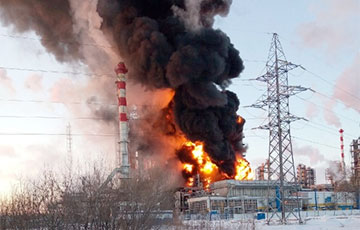Russia Halts Petrol Exports After Ukrainian Drones Destroy Refinery
5- 27.02.2024, 9:34
- 11,322

The ban will be in effect from March 1 to September 1.
The strikes of Ukrainian drones on Russian oil refineries have forced the Russian authorities to take emergency measures. The Russian government has imposed a temporary ban on petrol exports. It will be in effect from March 1 to September 1 this year, two informed sources told RBC.
The ban will not affect the agreed volumes of supplies to the EAEU countries, Mongolia, Uzbekistan, Abkhazia and South Ossetia. Also, according to RBC's sources, the government has decided to increase the norm of diesel sales on the exchange from 12.5% to 16%.
Deputy Prime Minister Alexander Novak appealed to the head of the government with a proposal to introduce a temporary ban on petrol exports. He noted in a letter dated February 21 that the domestic market will soon face a season of increased demand for fuel, which is associated with the period of spring field work, scheduled repairs at refineries, as well as summer holidays.
"In order to level the agitated demand for oil products, it is necessary to take measures to help stabilise prices on the domestic market of oil products," Novak said.
The Russian government already applied a ban on fuel exports last year. In September, the Cabinet resorted to this measure due to a sharp rise in wholesale prices. In November, the measure was cancelled. The Energy Ministry said at the time that a fuel surplus had been created in the domestic market in two months, and the exchange wholesale price of petrol had dropped significantly.
Since the beginning of the year, Ukraine has attacked at least nine Russian oil and gas facilities with drones, including refineries, oil depots and gas terminals in Bryansk, Kursk, Volgograd, Yaroslavl, Leningrad regions, Krasnodar Krai and St Petersburg.
As a result, petrol exports abroad collapsed by 37% in January, while diesel sales fell by 23%, the Russian Ministry of Energy reported. The drop in exports was the result of "unscheduled repairs" at oil refineries and the need to supply the domestic market, the ministry explained.
The Energy Ministry assures that there are and will be no problems with supplying the domestic market: petrol shipments in January increased by 7%, and diesel fuel - by 17%. In addition, stocks have been formed: 1.9 million tonnes of motor gasoline and 3.9 million tonnes of diesel fuel, the ministry stresses.
If the attacks continue with the current intensity, "an inconvenience could turn into a problem," said Sergei Vakulenko, a visiting fellow of the Carnegie Endowment for International Peace. "Refineries are important for the economy and for waging war - cars and trucks, tractors and combines, tanks and ships, civilian and military planes are to be fuelled with petrol, diesel and paraffin, not crude oil," Vakulenko said.










